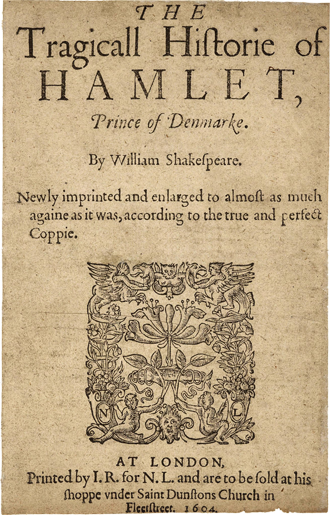Dido Queen of Carthage
Remembrances in Hamlet?
Could it be that one William Shakespeare was the first theatre critic to review Marlowe's play of Dido, Queen of Carthage?! Alas, probably not!
Hamlet's famous Player's Speech in Act II Scene ii of that play has the eponymous hero recalling a speech he remembers from a previous performance by the players. "One speech in't I chiefly loved - 'twas Aeneas' tale to Dido - and thereabout of it especially when he speaks of Priam's slaughter," by Pyrrhus (bent on revenge for the death of his father, Achilles). Hamlet begins by reciting some thirteen lines of the old play, before inviting a player to complete the lengthy speech [II.ii.448-514].
Hamlet:
I heard thee speak me a speech once, but it was never acted, or if it was, not above once - for the play, I remember, pleased not the million, 'twas caviare to the general. But it was, as I received it - and others whose judgments in such matters cried in the top of mine - an excellent play, well digested in the scenes, set down with as much modesty as cunning. I remember one said there were no sallets in the lines to make the matter savoury, nor no matter in the phrase that might indict the author of affectation; but called it an honest method, as wholesome as sweet, and by very much more handsome than fine. One speech in't I chiefly loved; 'twas Æneas' tale to Dido, and thereabout of it especially where he speaks of Priam's slaughter. If it live in your memory, begin at this line - let me see, let me see...
Hamlet, II.ii.430-445

Priam's violent death is recounted of course in both Aeneid and Marlowe's Dido. The recounted speech in Hamlet, by and large, bears little correspondence to either of these possible sources. There are a couple of details in the Hamlet speech that bear some resemblance to Marlowe's text, as remarked upon by editor in the Arden edition of Hamlet:1
Aeneas:
At last came Pyrrhus, fell and full of ire,
His harness dropping blood, and on his spear
The mangled head of Priam's youngest son...
Dido, Queen of Carthage, II.i.213-5
Hamlet:
Now is he total gules, horridly trick'd
With blood of fathers, mothers, daughters, sons,
Bak'd and impasted with the parching streets, ...
Hamlet, II.ii.454-5
and:
Aeneas:
Which he disdaining whisk'd his sword about,
And with the wound thereof the King fell down.
Dido, Queen of Carthage, II.i.253-4
Hamlet:
Pyrrhus at Priam drives, in rage strikes wide;
But with the whiff and wind of his fell sword,
Th'unnerved father falls.
Hamlet, II.ii.468-470
At most sees Shakespeare perhaps occasionally selecting from various sources within a speech of his own invention, but the speech is essentially designed for the dramatic purposes of Hamlet. "It is strange that distinguished critics have ever seriously maintained that Shakespeare lifted from some old tragedy, his own or another's, a speech so manifestly designed for the place it has in Hamlet. Argument has centred on whether the speech is serious or satiric, whether it burlesques or emulates the style of earlier tragedy, and especially Marlowe's and Nashe's Dido. But identity of subject does not conceal an essential difference of purpose: the speech in Shakespeare has to stand out from the drama which surrounds it and which is already removed from ordinary life; and this ... demands a style which rises above normal theatrical elevation as the latter does above natural speech".2
Footnotes:
- Note 1: , Hamlet, Arden Edition (Methuen & Co Ltd, 1982) p.103. Back to Text
- Note 2: Ibid p.479 (Longer Notes). Back to Text